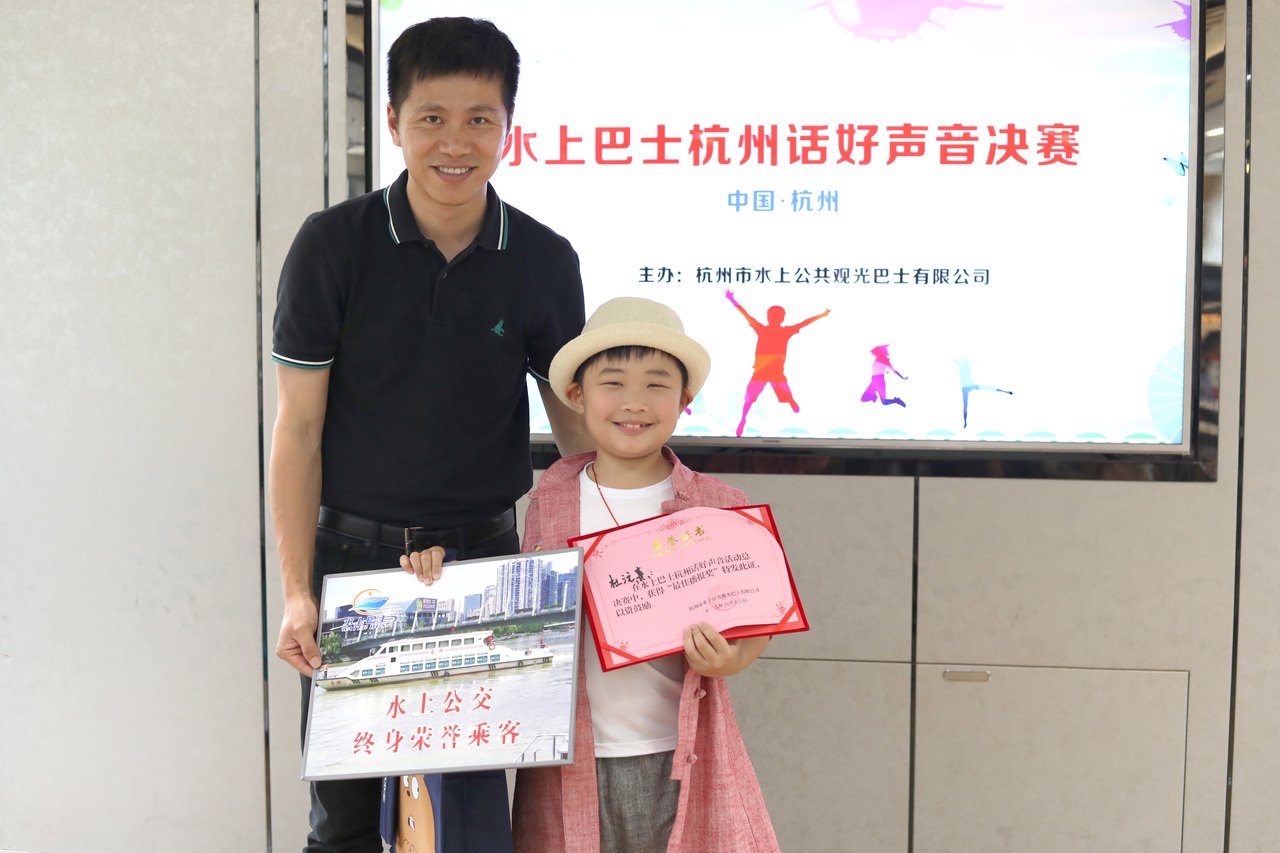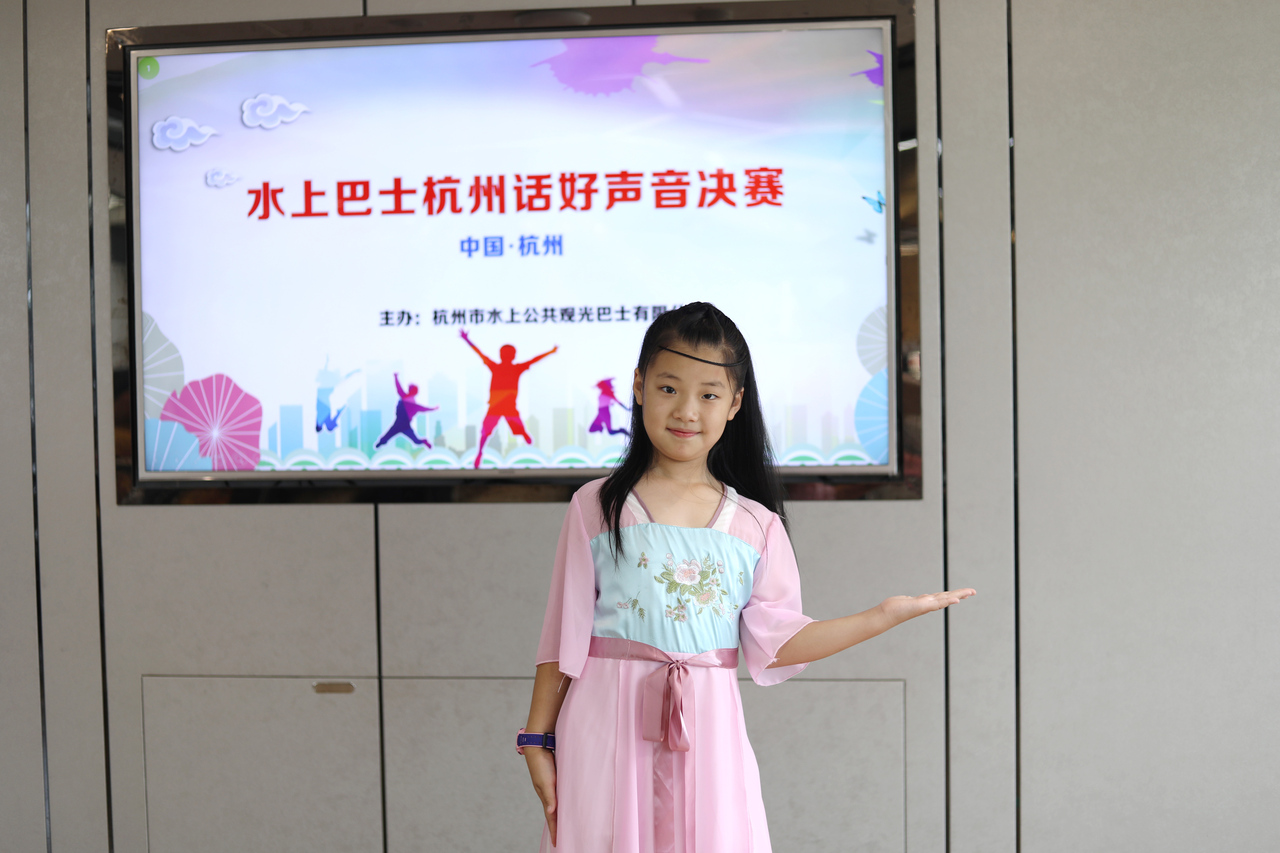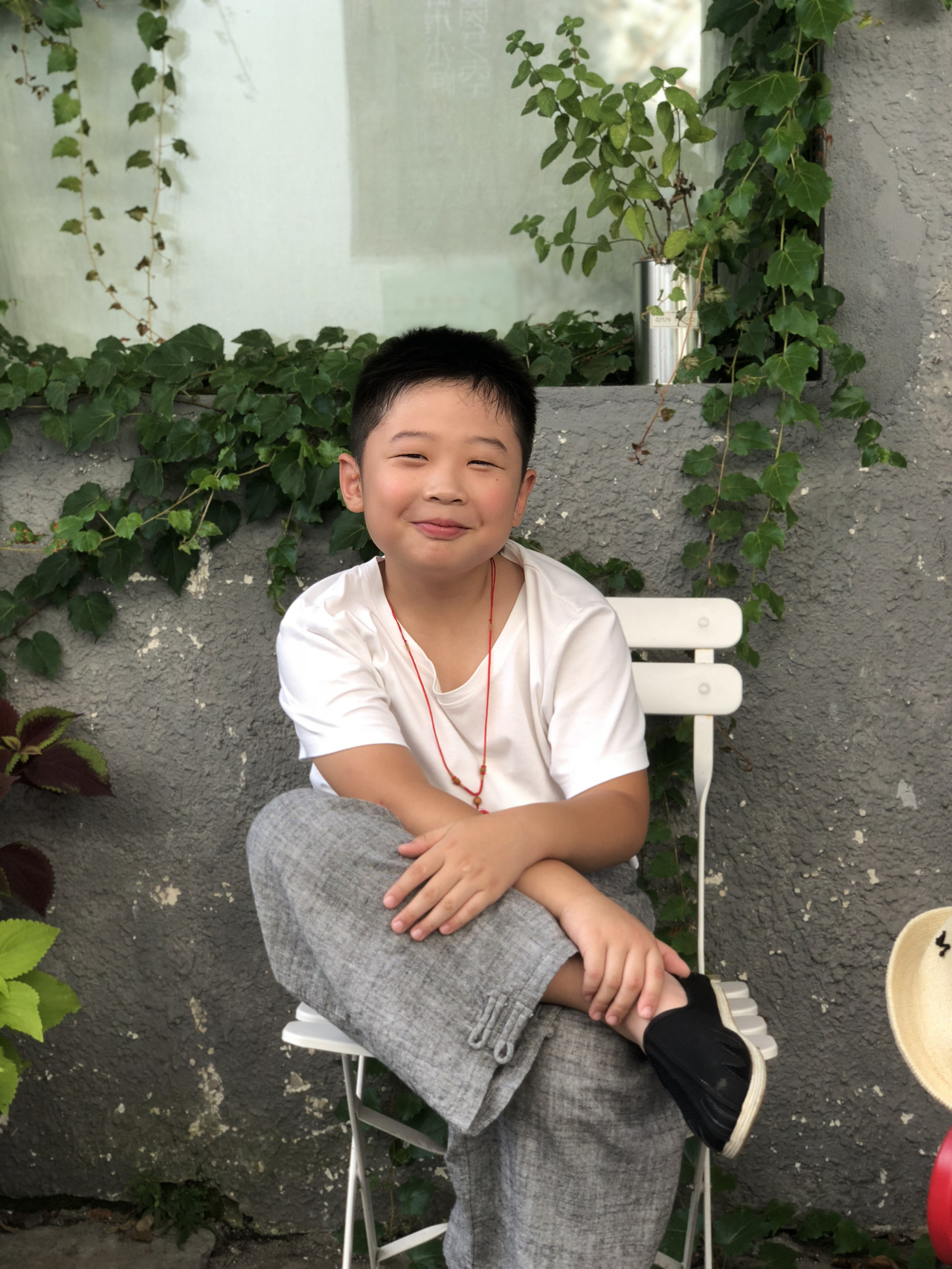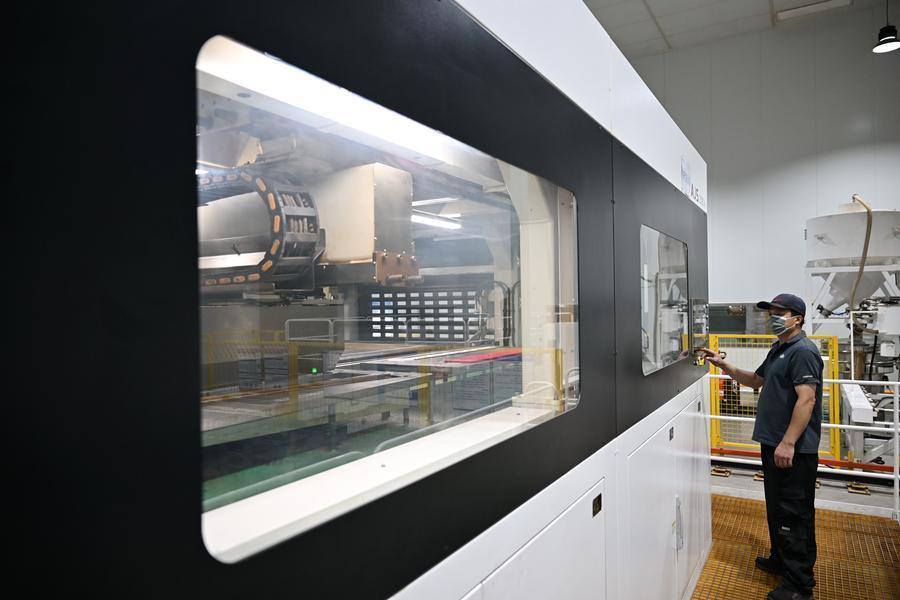“各位乘客,前头将要停靠武林门站,要来东这里落船的乘客请做好准备,落船的时光嫑忘记自己的随身物品。”
开学就上三年级的杜沅熹和冯妙菡大概没想到,2019年的这个暑假,他们因为会说杭州话火了。
今年8月开始,杭州水上公交1号线试行“三语报站”,这是杭州目前唯一一条“三语播报”的水上公交线路——在原来普通话、英语的基础上加上杭州方言报站,即播报采用一遍普通话、一遍英文报站,外加一遍杭州话的形式。
为了寻找合适的童声播报员,杭州市水上公共观光巴士有限公司今年特地举行了一场“水上巴士杭州话好声音”海选活动,来自杭州时代小学的杜沅熹和杭州卖鱼桥小学教育集团的冯妙菡经过层层筛选,历经自我介绍、才艺表演到模拟报站各种考验,最终被选为播报员。

杭州伢儿就得讲杭州话
眯眯眼的杜沅熹特别有喜感,他一点都不怕生,见面不到几分钟,就凑到我们旁边,隔一会儿会冒出很多的问题来把你逗乐。办公室里在座的大人都说,不喜欢他很难。问他喜不喜欢说杭州话,他脱口而出说“欢喜的”,还会告诉你,他的理想是当一名相声演员。还别说,小圆帽一戴,红色中式外套一穿,杭州话一出口,还真有点相声演员的样子。
说起孩子讲杭州话,杜沅熹的妈妈李赟颇为自豪:“杭州话就是他的母语,不是特意学的,而是从婴幼会说话时开始讲的就是杭州话,这是一种深入骨髓的东西。”
杜沅熹的全家人都有一个共识,就是在家全部讲杭州话,希望孩子能把杭州话传承下去,“我觉得语言就是一种文化。现在大部分的杭州孩子,都是会听,但不会说或者说得不太准确。我们坚持让孩子说杭州话,就是希望这个语言文化不要丢失。”妈妈李赟对语言和文化都很重视,让孩子说杭州话也是她很坚持的事情,“说杭州话,和我们学英语一样,它需要语境和氛围让孩子用杭州话去表达。平时在学校没条件,在家,我们就要把他的杭州话‘频道’调回来。”
其实,杜沅熹会说杭州话,在生活和学习中还真是“加分”不少。幼儿园里,他凭“爱说杭州话”在学校是出了名的。老师们都知道,那个很爱讲杭州话的小伢儿()就是他,让他一下子人气“爆表”,胆子也慢慢变大了。有次演出,杜沅熹本来是演一个没几句话的农夫配角,老师说,你既然杭州话说得很溜,就干脆说杭州话吧,没想到“一说成名”。

杭州话和杭州普通话不一样
同样的,冯妙菡在家也是杭州话一直“在线”。
妈妈李雪琼非常支持她说杭州话:“孩子小时候杭州话很溜的,可上幼儿园以后,大部分同学和老师都说普通话,就慢慢被‘带走’了。那时候就觉得很可惜,我们一大家子人都是老杭州,全部说杭州话,不希望到女儿这里把杭州话丢了。”于是,进了小学后,妈妈看到学校有开设“杭州童谣”的社团,就让孩子去了,“一方面是希望她性格更开朗,另外是希望她把杭州话学好。”
一周一次课,冯妙菡比以前胆子大了很多,也自信了很多。语言就是有这样的魅力,能迅速拉近你和他人之间的距离。
穿了一身汉服的冯妙菡长得很清秀,眨巴眨巴大眼睛,用杭州话应和着说,自己现在介绍杭州十景以及唱老杭州的“阿六头之歌”都很厉害了。
这时候冯妙菡的外婆笑了:“她说着说着就会把杭普话‘搬’进来,在家经常闹笑话。我们大家都是先笑一通,然后给她纠正。像玉米,老底子杭州话叫‘尼叟’,她以前都直接说成玉米,我就跟她说这个是错的。”

点赞方言报站,传播杭州文化
让杜沅熹现场说说自己最拿手的杭州话,他选了一段介绍杭州的小热昏《杭州好地方》。这是他参加这次比赛的才艺展示,近两分钟的词稿居然一口气顺畅地说下来。杜沅熹说,这还不算很难的,上次他参加首届“小伢儿说杭州话”四六级挑战赛,自己还专门用杭州话配音《小猪佩奇》,难度更大。
别看表演很溜,其实背后的付出也是很大的。每次去表演,或者去参加比赛,准备工作基本上是全家总动员,妈妈和爸爸每次都做好功课,写个杭州话版本的台本来教孩子。
就像这次为水上巴士播报站,他们也是拿到普通话版本后,妈妈和爸爸在家研究如何表述会比较好,写了一个版本请专业老师审核把关,然后再教孩子用杭州话读出正确的发音。如何更好地表述,妈妈李赟也有一番考量:“因为报站是属于比较正式的,不太能随意发挥,所以文字还是比较尊重普通话版本的。不过,从普通话翻译到杭州话,里面的文字还蛮好玩的,比如‘不要’,杭州话里面,就一个‘嫑’字,乘坐就是一个‘乘’,还有像‘来东’‘前头’‘落船’,都是大家一听就知道是杭州话的表述。”
冯妙菡说,她在做录音准备的时候,都是用拼音标注发音的,比如,“谢谢支持”,她就标成“jiajia zizi”,其中濮家站的“濮”字,全家人还一起讨论了一番,“我一开始说错了,其实是读‘白’(谐音),我直接按照普通话读pu,后面才知道是错的。”
杭州话版本的报站推出近半月,杭州市水上公共观光巴士有限公司后台反馈的好评率一直不错,特别是很多老杭州人点了赞。
杭州的沈大姐每天乘坐水上巴士公交从拱宸桥到武林门码头,第一天乘坐,就在自己的朋友圈里发了消息,点赞的特别多。“毛发靥类!”沈大姐一聊起这个话题就很兴奋,她觉得最好玩的就是找了小孩子来播报,“小伢儿一本正经播报,我听一遍笑一遍,太好玩了。我回去就跟我6岁的孙子说了,跟我好好学杭州话,下次也来当播报员。”
“语言可以说是地理文化的纽带,有着不可替代的价值。”杭州市水上公共观光巴士有限公司副总经理金之江透露,水上巴士公交的乘客,有30%是杭州本地人,70%是游客,“可以说,这里也是一个传播杭州文化的窗口。今年在杭州水上巴士公交15周年之际,推出‘杭州话’版本的报站,既是宣传杭州文化,也是保护杭州文化。”
“我们找小朋友来录制,是觉得孩子的播报更有亲和力,声音一出来就很有亲切感,大家都能接受,听着也好玩。”
金之江介绍,杭州水上巴士公交共有4条线路,目前推出杭州话报站的,是水上公交1号线的四条船舶,分别是西溪号、西湖号、运河号、钱江号。接下来,如果反馈都还不错,他们还考虑继续把这个报站推到其他线路上去。
In August 2019, the sightseeing boats that shuttle between the Wulin Gate and the Gongchen Bridge in the Hangzhou section of the Grand Canal of China adopted a stop announcement in Hangzhou dialect. Before, the sightseeing boats gave information on the stops of the route through a prerecorded Chinese-English announcement routine. Now, the information is broadcast in the Putonghua, English and Hangzhou dialect.
The dialect version is delivered in the voices of Du Yuanxi, a preteen boy from Shidai Primary School and Feng Miaohan, a preteen girl from Maiyuqiao Primary School. The boy and the girl will become third graders after the summer vacation I 2019.
The Hangzhou dialect announcement is designed to enhance the local culture and add an unusual touch to the charms of the Grand Canal section in Hangzhou, which served as the southern departure point of the Grand Canal for north-bound ships that carried cereals and other necessities for more than ten centuries. The adoption of the dialect announcement is the city’s latest move to keep the dialect alive as most children living in Hangzhou don’t speak the dialect at all. The modernization drive of the past four decades has brought a lot of prominent changes to the whole country. One change, though not seemingly so tangible, is that most children in cities grow up speaking Putonghua, the official language, at home and in school, for not speaking Putonghua well would give them a disadvantage in school, let alone in the distant future when they become adults. For this and many other reasons, dialects are phasing out to varying degrees. Some linguists are worried that some dialects are doomed to vanish. To turn the trend around or slow it at least, some people are doing their best to keep their dialects alive.
Du and Feng come from families in Hangzhou which work hard to keep Hangzhou dialect alive at home.
Li Yun, Du’s mother, says that the dialect is the boy’s mother tongue. The dialect is spoken at home and it runs in his heart and soul. The family consensus was reached even before the baby boy came into the world. While most of his contemporaries spoke Putonghua at home, the first words Du learned to speak were in the local dialect. All the family members speak the dialect at home and they want the boy to carry on the beautiful dialect, which the family considers a cultural treasure. Though the boy speaks Putonghua in school, he switches back to the dialect as soon as he is home. In fact, speaking the Hangzhou dialect made him popular at the kindergarten. All the teachers in the kindergarten knew him as a cute boy how loved to speak the dialect. He rose to fame overnight in a show at the kindergarten. When he was given a small role with a few lines, the teachers advised him to show off his dialect prowess. Du was the brightest star at the show.
Feng Miaohan grew up speaking the dialect at home as the dialect has run in the family for generations. However, the girl somehow lost a touch or two in speaking the dialect as all the teachers and most of her friends at the kindergarten spoke Putonghua. This worried her parents a great deal. When she graduated to the primary school, her parents signed her up to take a course in learning to speak nursery rhymes in Hangzhou dialect. They hoped that such an after-class undertaking could enable the girl to speak the dialect better and make more friends. The family is eager to coach the girl in saying things correctly in the dialect.

Du and Feng were winners of a public competition organized by the city’s public transit authorities that operates the sightseeing boats on the canal. The competition was fierce. Du and Feng was picked simply because they perfectly demonstrated an unsurpassed proficiency in speaking the dialect among their contemporaries. Du and Feng recited some pieces made famous among the local population by celebrated personalities in Hangzhou who are dedicated to promoting the Hangzhou dialect. , a 30-minute evening news program on Hangzhou Television since 2004, officially started the movement of keeping the dialect alive and enhanced the public awareness of the dialect. The pieces the boy and the girl recited at the competition came from some celebrities who regularly host the TV news report program.
The boy and the girl got help from their parents and other relatives in preparing for the competition. After the competition, the preteens also received numerous tips from their parents in figuring out how to adapt the official text in Putonghua to a version in the dialect for the stop announcement.
Since the dialect announcement premiered in August 2019, local residents and tourists have responded warmly. In particular, those locals who still speak the dialect in their everyday life like the announcement and find the voices of the two children cute. “Thirty percent of our passengers are locals and the rest are tourists from beyond Hangzhou,” observes Jin Zhijiang, a manager with the sightseeing transit system. “The boats are a public window on the local culture. This year marks the 15th anniversary of the launching of the canal transit system in the city. The announcement in the Hangzhou dialect promotes and preserves the dialect.”
According to Jin, four boats on the canal section now use the dialect announcement. The company is thinking of using similar dialect announcements for other transit routes operated by the company.





